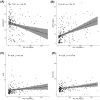Chitinase-3-like protein-1 at hospital admission predicts COVID-19 outcome: a prospective cohort study
- PMID: 35534648
- PMCID: PMC9084263
- DOI: 10.1038/s41598-022-11532-x
Chitinase-3-like protein-1 at hospital admission predicts COVID-19 outcome: a prospective cohort study
Abstract
Infectious and inflammatory stimuli elicit the generation of chitinase-3-like protein-1 (CHI3L1), involved in tissue damage, repair and remodeling. We evaluated whether plasma CHI3L1 at disease onset predicts clinical outcome of patients with Coronavirus 2019 (COVID-19) disease. Blood from 191 prospectively followed COVID-19 patients were collected at hospital admission between March 18th and May 5th, 2020. Plasma from 80 survivors was collected one month post-discharge. Forty age- and sex-matched healthy volunteers served as controls. Primary outcome was transfer to intensive care unit (ICU) or death. CHI3L1 was higher in COVID-19 patients than controls (p < 0.0001). Patients with unfavorable outcome (41 patients admitted to ICU, 47 died) had significantly higher CHI3L1 levels than non-ICU survivors (p < 0.0001). CHI3L1 levels abated in survivors one month post-discharge, regardless of initial disease severity (p < 0.0001), although remaining higher than controls (p < 0.05). Cox regression analysis revealed that CHI3L1 levels predict primary outcome independently of age, sex, comorbidities, degree of respiratory insufficiency and systemic inflammation or time from symptom onset to sampling (p < 0.0001). Kaplan-Meier curve analysis confirmed that patients with CHI3L1 levels above the median (361 ng/mL) had a poorer prognosis (log rank test, p < 0.0001). Plasma CHI3L1 is increased in COVID-19 patients and predicts adverse outcome.
© 2022. The Author(s).
Conflict of interest statement
The authors declare no competing interests.
Figures



Similar articles
-
Analysis of Chitinase-3-Like Protein 1, IL-1-Alpha, and IL-6 as Novel Inflammatory Biomarkers for COVID-19.J Interferon Cytokine Res. 2022 Oct;42(10):536-541. doi: 10.1089/jir.2022.0065. Epub 2022 Aug 12. J Interferon Cytokine Res. 2022. PMID: 35960307
-
Plasma YKL-40 and CHI3L1 in systemic inflammation and sepsis-experience from two prospective cohorts.Immunobiology. 2013 Oct;218(10):1227-34. doi: 10.1016/j.imbio.2013.04.010. Epub 2013 Apr 24. Immunobiology. 2013. PMID: 23706599
-
Chitinase-3-like protein 1 is an independent risk factor for the early failure of forearm autologous arteriovenous fistulas in uremic patients.Ther Apher Dial. 2021 Dec;25(6):939-946. doi: 10.1111/1744-9987.13623. Epub 2021 Mar 16. Ther Apher Dial. 2021. PMID: 33486888
-
Role of Chitinase 3-like 1 as a Biomarker in Multiple Sclerosis: A Systematic Review and Meta-analysis.Neurol Neuroimmunol Neuroinflamm. 2022 May 9;9(4):e1164. doi: 10.1212/NXI.0000000000001164. Print 2022 Jul. Neurol Neuroimmunol Neuroinflamm. 2022. PMID: 35534236 Free PMC article.
-
Significance of chitinase-3-like protein 1 in the pathogenesis of inflammatory diseases and cancer.Exp Mol Med. 2024 Feb;56(1):1-18. doi: 10.1038/s12276-023-01131-9. Epub 2024 Jan 4. Exp Mol Med. 2024. PMID: 38177294 Free PMC article. Review.
Cited by
-
Immune Dysregulation in the Oral Cavity during Early SARS-CoV-2 Infection.J Dent Res. 2024 Nov;103(12):1258-1270. doi: 10.1177/00220345241271943. Epub 2024 Oct 12. J Dent Res. 2024. PMID: 39394771 Free PMC article.
-
Recently Updated Role of Chitinase 3-like 1 on Various Cell Types as a Major Influencer of Chronic Inflammation.Cells. 2024 Apr 14;13(8):678. doi: 10.3390/cells13080678. Cells. 2024. PMID: 38667293 Free PMC article. Review.
-
Research advances in serum chitinase-3-like protein 1 in liver fibrosis.Front Med (Lausanne). 2024 Jun 19;11:1372434. doi: 10.3389/fmed.2024.1372434. eCollection 2024. Front Med (Lausanne). 2024. PMID: 38962736 Free PMC article. Review.
-
Circulating markers of neutrophil activation and lung injury in pediatric pneumonia in low-resource settings.Pathog Glob Health. 2023 Dec;117(8):708-716. doi: 10.1080/20477724.2022.2160885. Epub 2022 Dec 22. Pathog Glob Health. 2023. PMID: 36562081 Free PMC article.
-
Chitinase-3-like Protein 1 Is Associated with Poor Virologic Control and Immune Activation in Children Living with HIV.Viruses. 2022 Nov 23;14(12):2602. doi: 10.3390/v14122602. Viruses. 2022. PMID: 36560606 Free PMC article.
References
Publication types
MeSH terms
Substances
LinkOut - more resources
Full Text Sources
Medical
Research Materials

